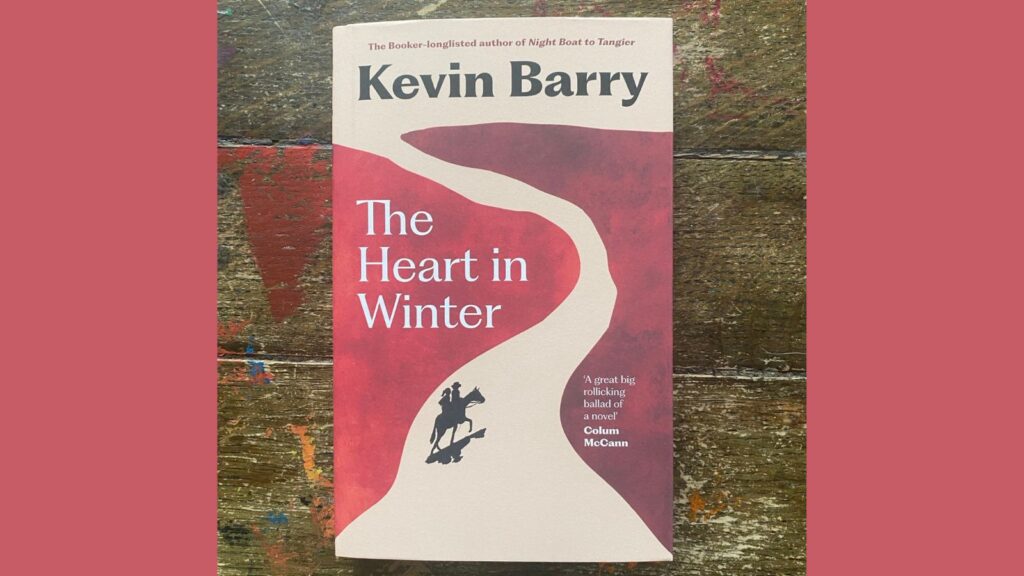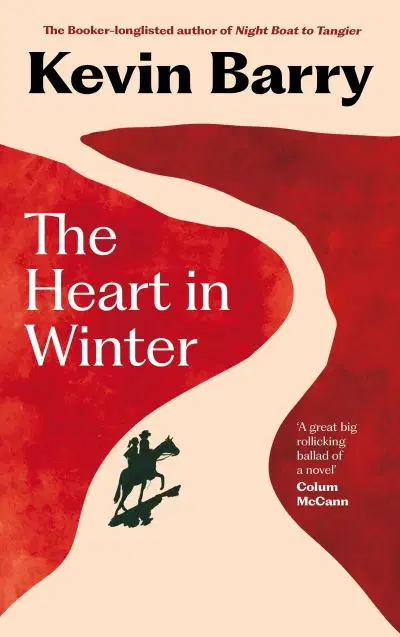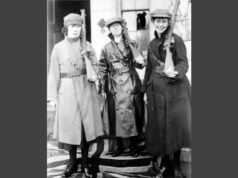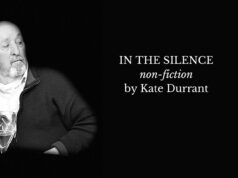
The Heart in Winter|Kevin Barry|Canongate
The Heart in Winter by Kevin Barry is an exhilarating read, a forbidden love story at once tender and violent
by Eoghan Smith
It begins with a dirty, drunken, degenerate Irish emigrant stumbling through the streets of Butte, Montana lilting about potatoes into the starry American night.
He has no name: he is just ‘some crazy old meathead in a motley of rags and filthy buckskin.’ To the watching Tom Rourke, the protagonist of Kevin Barry’s The Heart in Winter, this ‘patent Irishman’ inspires a mixture of feelings. On one hand, Rourke experiences fondness and recognition for the down-and-out, and, on the other, a feeling of dread: ‘to be old and mad and forgotten on the mountain – was it all laid out the fuck ahead of him?’ It is certainly possible that it will be all laid out ahead of him because Rourke is exactly the kind of untamed Irish emigrant who might flounder in a rough mining town in 1890.
Rourke is exactly the kind of untamed Irish emigrant who might flounder in a rough mining town in 1890
And floundering he is, at least when we meet him first. The opening to The Heart in Winter is a narrative masterclass in tightly controlled tumult. Drinking his way through the town’s bars, Rourke walks ‘as a calamity…twitching like a motherfucker out of control.’ In the short hours between racking up rent arrears, feeding his dope habit, and getting completely slashed, he works as a photographer’s assistant to a man named Sullivan.
Rourke is an unfriendly loner who refuses to live among his fellow Irishmen: ‘sentimental pigfuckers to a man’ – and Rourke should know. There is a touch of the self-detesting romantic about Rourke: he is an impulsive balladeer prone to wild mood swings and imaginative spontaneity. He has an eye for opportunity, employing his literary skills by writing letters to women for illiterate men who are seeking wives. The only women Rourke knows are Butte’s prostitutes, especially the kinky Greta, originally of Germany: ‘she twisted a slender Bavarian thigh and locked it tightly around his jaw and squeezed and upwards he gazed with mild dismay across the lid of her cunt.’
There is a touch of the self-detesting romantic about Rourke: he is an impulsive balladeer prone to wild mood swings and imaginative spontaneity
But there is also some depth to Rourke, whose rowdy, anarchic life is in contrast to the ‘quiet and stillness’ he admits he really wants. Beneath all the surface-level chaos that Butte inspires there exists a man who is struggling with the order and meaning of things. His faith in God dies and he contemplates slashing his wrists with a razor, before baulking sorrowfully at the prospect (‘because what kind of a fucking Irishman can’t even do away with himself?’).
Just when it seems all is lost, Rourke’s savior comes in the form of Polly Gillespie, newly arrived from the east and freshly married to a self-flagellating religious zealot named Anthony Harrington. To fake her virginity, Polly buys ‘spurts of pigs blood that was all fixed up in what looked like sausage casings.’ When Harrington brings Polly to Sullivan’s studio for their matrimonial photograph, the two immediately fall for each other, beginning an affair and then making a break for it in the direction of California. Their love is depicted as genuine, deep and enduring:
[Tom] said all kinds of sweet things too. Things that from any other man she’d have run a half mile from and fast. Things like he said that whatever their souls were made of they were of the same substance. But she believed that then and she believes it still.
Once Polly and Rourke set out on the road in energetic abandon, The Heart in Winter settles into a conventional structure that can accommodate the wildness. The couple make their way through Montana and Idaho while soon being trailed by a posse of gunmen hired by Harrington to find them. Barry beautifully calms the mania with injections of tranquility. As the lovers escape their pasts across the American landscape, there are moments of gentle quietness, and an image of America as a pastoral idyll is glimpsed.
Barry beautifully calms the mania with injections of tranquility
There are gothic flourishes too that speak to the violence of the American past: in the land of the Nez Perce ‘there were lingerings of old melancholy’ that ‘fed the romance with a darkness […] the haunted music of the place pierced the high country air.’ The American West is depicted as a country of wandering migrants, eccentric religious fanatics, drug-taking dropouts, sexual deviants, and unscrupulous gangsters, all mixed together in a soup of antagonism and barely stuck together by the bonds and resentments of cultural and ethnic attachments. At any moment violence could break out, and, as the posse catch up with Rourke and Polly, violence does break out, becoming more intense, more primeval, more awful.
Sometimes Barry’s instinct is to reach for a joke – often with an expletive for additional emphasis – that will ambush the reader journeying to the profound, and if the narration drifts too far towards the sublime, he quickly pulls it back with an earthy image or phrase. This is all part of both the novel’s method and its coarse charm. The seduction of instinct is too great for drifters like Rourke and Polly. After a night of consuming hallucinogenic mushrooms, Polly suggests to Rourke they save the rest until they get to California:
They looked at the fungi another while. It wasn’t time for sleep yet by the feeling of things. Fuck it, he said, and he scooped up a half-share of the mushrooms, and he took to chewing them, and she did the same with the rest.
The riot of sex, drugs and balladeering lends to The Heart in Winter the tragic-comic edge of rock’n’roll yarn, and makes the novel a hoot to read. While the story itself is not dense, somehow it feels like an epic, perhaps because of its geography, perhaps because of its thematic expanse. But it is also epic in the unlaboured subtexts that give wider meaning to the story of Rourke and Polly: the history of migration to America, the catastrophes that were inflicted upon native Americans, the industrialization of the continent. And in The Heart in Winter there is also a low but constant beat of the metaphysical, those religious and artistic impulses that throb beneath the petty mayhem of the human heart.
The riot of sex, drugs and balladeering lends to The Heart in Winter the tragic-comic edge of rock’n’roll yarn, and makes the novel a hoot to read
Barry has confirmed again that he is the master of the narrative voice. There is not a sentence in the novel that sounds off key or out of place. His supreme skill as a writer of the strange shot through with just enough traces of the familiar is incontestable. As in his earlier novel City of Bohane, the language in the book is recognisably of somewhere and yet of nowhere in particular. The Heart in Winter also contains a stylised narration that evokes the cultural imaginary of the West but which is not designed to be authentic to it; it is a contemporary Irish emigrant novel of the nineteenth-century American west with its own particular vernacular. The novel also contains illuminating, postmodernist, self-referential moments about writing:
…the halt and the lame, the mute and the hare-lipped, the wall-eyed men who heard voices in the night – they could all be brought up nicely enough against the white field of the page. Discretion, imagination and the careful edit were all that were required.
That seems a good description of Barry’s method in the book, and there are other roguish allusions too, which add to the overall sense of playfulness in the novel. But for all that, at the centre of the book is the genuinely affecting relationship between Rourke and Polly. The Heart in Winter is an exhilarating read, a forbidden love story at once tender and violent, an Irish-American picaresque in miniature, a love song to the maverick soul, distilled though the best of Barry’s linguistic brio and bawdy humour.

Eoghan Smith is the author of The Failing Heart (2018), A Provincial Death (2022), and his latest novella, A Mind of Winter is out now with Dedalus Books.












